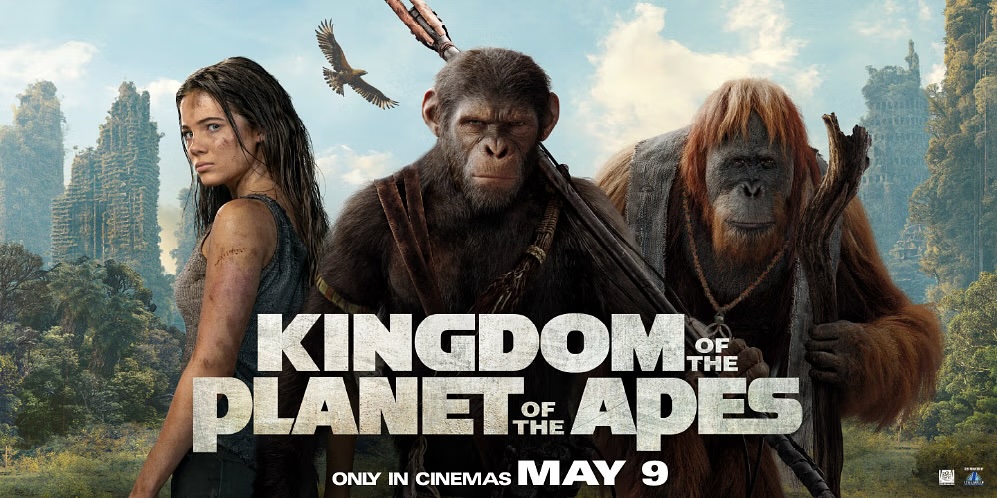Kingdom of the Planet of the Apes ~ Review

Amazingly, the Planet of the Apes franchise has spawned so many decent to great movies. The original Apes from 1968 is one of the most iconic science fiction films ever made, with one of the most famous final shots in cinematic history. You'd expect that the following four movies would be pretty bad, however, each subsequent Apes film has expanded the world or played with the bleak socio-political themes of the original to brilliant effect. Hell, even the Tim Burton-helmed remake has Rick Baker's incredible makeup and amazing production design that makes it worth a watch.
2011's Rise of the Planet of the Apes could have been another creatively bankrupt endeavor exploiting a years-dead IP. Instead, Rise was a true sci-fi spectacle, taking the themes of the original five movies and exploring them with a surprising amount of depth and warmth. A semi-prequel to the original film and semi-remake of 1972's Conquest of the Planet of the Apes (the fourth film in the original series) following how Caeser became the leader of a group of apes in San Francisco.
If Rise was good, its immediate sequels 2014's Dawn of the Planet of the Apes and 2017's War for the Planet of the Apes were even better. Director Matt Reeves took what was laid out in Rise and expanded Caeser's character – creating a sci-fi epic about the nature of power and the cost of revenge. Now, seven years and one corporate merger later brings us, Kingdom of the Planet of the Apes, hoping to kickstart a new Apes trilogy. How does this entry stack up to the others?
At the end of 2017's War for the Planet of the Apes – Caeser led his group of apes to a new land but eventually died. Now "Many generations" later, Caeser has either passed to myth or has been completely forgotten by the ape population. Humans have grown mute due to complications from the manmade virus that created the hyper-intelligent apes in the first place. It is here that we meet the young chimpanzee Noa (Owen Teague), a member of the Eagle Clan. They live their peaceful existence amongst the overgrown and rusted-out husks of buildings from the ruined world. Eagle Clan's peace is shattered when their village is attacked by a group of warrior apes.
These warriors are trying to hunt down a mysterious human Mae (Freya Allan). Noa is left for dead while the Eagle Clan is captured and taken to the cruel ape, Proximus (Kevin Durand brilliant as always), a would-be king who has designs on a mysterious vault that he's found. The film follows Noa's quest to reach Proximus and save his clan. Along the way he meets Raka (Peter Macon) a follower of Caeser's teachings, and reluctantly teams up with Mae.
The biggest problem with Kingdom of the Planet of the Apes is bloat. A whole lot is going on here that is underdeveloped and under-explained. This wouldn't necessarily be a problem, but the way the script (written by Josh Friedman) explores the various ideas brought up, feels completely rushed, like the film was initially three hours, but was shortened at the last minute. It all feels like the film is trying to set up the next two sequels as opposed to really digging deep and exploring the characters and themes it's presenting here.
Light spoiler warning. For example, Mae the human girl who is not all she seems, has a mission throughout the film to bring something from the vault that will bring humans back as the dominant species on Earth. Which is all well and good, but it's unclear to me why Mae wants this to be the case. If this is "many generations" post-Caeser, and Mae is all of twenty…how exactly does she know any of the things she knows? Why did the humans send her on this mission? All of this feels like it is kept as deliberately vague sequel bait, something Rise, Dawn, and War largely avoided.
I don't want to come across too negative here, because so much of Kingdom works. The acting across the board is fantastic, particularly from the ape actors – Peter Macon as Raka nearly steals the entire film. Director Wes Ball stages unique action sequences, and cinematographer Gyula Pados creates a stunning moody atmosphere, with overgrown and rusted-out buildings looming in the distance. A standout sequence is an homage to the original 1968 film where the apes hunt a group of humans.
Of course, we can't talk about a modern-day Apes film without talking about the special effects, and the motion capture is incredible. All the apes feel distinctive, and human, while also feeling like real animals. It's astounding to watch this series and watch the special effects grow in real-time.
All in all, Kingdom of the Planet of the Apes acquits itself as a good entry in the franchise. If it doesn't reach the highs of the previous entries, that's okay, the film has more ambition than most modern-day blockbusters, and these days that might just be enough.
Three out of four stars.
 WhoRepresents.com is safe & secure
WhoRepresents.com is safe & secure